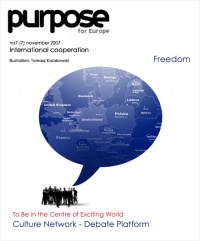
Feature
Where are the Others?
Naturally – in accordance with the idea behind the creation of the EU structures – one should praise this kind of initiatives. It’s been known for long that the exchange of experience among neighbours has beneficial influence on each domain of human activity – owing to this exchange it is possible to find better logistic solutions (identification of the status of artists in other countries, the analysis of cultural infrastructures and of the systems of funding art), to broaden the spectrum of artistic inspirations, and to popularize artistic achievements internationally. Contemporaneousness, defined in the global categories of the flow of information, has to strive for opening borders, has to consist in comparing various, often contradictory, cultural trends.
It should be pointed out that organizations which support international artistic cooperation are doing quite well. Indeed, artists get various scholarships, show their works in galleries abroad and acquire new audiences (we mustn’t forget that international artistic success very often means financial success too). Of course, one can always complain and say it could be better. Malcontents are everywhere. Anyway – the situation is not so bad, and let’s hope it will be even better – European integration is a continuous process and how we contribute to its advancement depends solely on us.

illustration: Tomasz Kaczkowski
After this portion of right and popular ‘pro-integration’ cliches it’s worth to ask a few inconvenient questions. All right, we are in the Union, we are helping our artists to become internationally known, and are willing to host artists from other countries and offer them opportunity to show their works in ‘our’ art galleries. Let’s say that this objective has been more or less achieved. However, this useful work makes me sort of disgusted. Those concepts are simply too beautiful to contribute to the real development of culture. The idea of a cross-culture dialogue is too often an excuse for various paraartistic second-rate activities. The idea of free artistic cooperation too often becomes an alibi for artistic humbug. A dialogue shouldn’t be a value in itself. Everything depends on how well prepared are those involved. Of course, we should try facilitate the discussion, but we mustn’t allow it to change into a tautological rubbish: „it’s worth talking that it’s worth talking”, „it’s worth sanctifying the experience that it’s worth exchanging experience”. This will lead us to nowhere.
A human dialogue is often said to make us open to what is different – by learning about other cultures we are learning about the alternative ways of shaping the reality. This concept is true to some extent, but it’s rather naïve too. Yes, by learning about other cultures we are gaining new experience, but we keep placing ourselves in a position of a tourist who will see and taste, of course, but who will never be able to feel his difference properly. Too often the idea of exchanging experience is nothing but tourism sensu stricto – we are dazed by the otherness of the world we are exploring, but we are rather superficial in this experience. Another problem is that the majority of artistic environments (mainly the European ones) actually „got integrated” long ago: they believe in similar ides, they create in a similar spirit. It’s difficult to find differences in this cosmopolitan group which for long has been exchanging ideas successfully.
Where to look for „otherness”? Who or what with can we start an authentic dialogue? I think that we should both go beyond the European Union, but also seek some inspiration in our vicinity – in places where otherness has not yet been annexed by the western style of life. We can find such unconsumed otherness also in ourselves, and in the margin of pro-Europe transformations. We should broaden the scope of our interests – find ‘the Others’ outside the world of Western values. This world is both far away and much closer than it seems. While discussing with otherness it’s not only worth looking at some remote lands, but also trying to think about this non-annexable margin which we are so busily hiding from ourselves.
Check the archive

nr 38 November 2007
theme of the issue:
INTERNATIONAL COOPERATION
< spis treści
Article
From the Editors
Presentation
International design transfer
Analysis
National interest is not necessarily inconsistent with the universality of culture - Artur Zaguła
Culture Industries
Freedom - Maciej Mazerant
Young Culture
"Youth in Action" - conversation with Karolina Rutkowska
Feature
Where are the Others? - Kuba Wandachowicz





